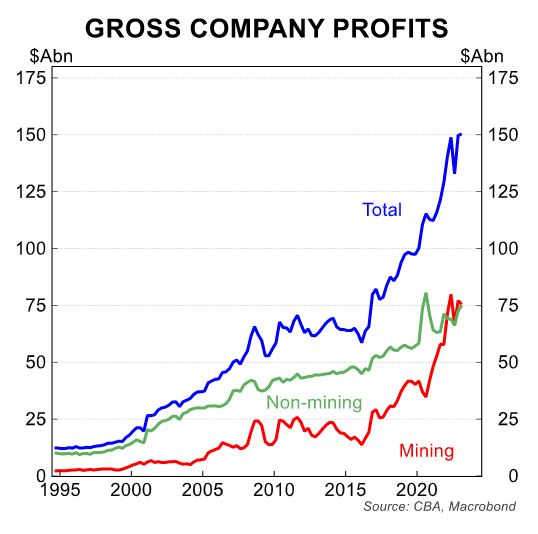The latest national accounts showed how Australia’s terms-of-trade is hovering near record highs on the back of soaring gas and coal prices via the Russia-Ukraine War:

These soaring commodity prices have seen mining profits more than double such that the mining sector, which only employs around 2% of Australians, now earns as much profits as all other businesses combined:

Because energy companies are foreign-owned and Australia does not have a workable super profits tax, most of the bounty from the Ukraine War rise in prices is flowing offshore to foreign shareholders.
Meanwhile, domestic energy prices have soared, leaving Australian households and businesses worse-off, without Australians gaining the upside from the gas and coal resources they own.
Under current arrangements, the more coal and gas Australia exports, the richer foreign-owned mining companies become, and the poorer Australians get (via paying higher energy prices).
Basically, Australian workers are going backwards due to negative real wage growth and businesses are being sent to the wall by soaring energy costs, while the foreign-owned energy cartel gouges ruthlessly earning super profits that Australians do not share in.
Former director of the OECD, Adrian Blundell-Wignall, penned an article in The AFR calling on the Australian government to emulate Norway’s mining super profits tax and sovereign wealth fund.
“Contrary to the rhetoric of the mining lobby, the industry is not a jobs driver”, Blundell-Wignall notes.
“It is a tiny employer (barely 2% of the workforce). But it has a large share of the economy due to profits. It’s productivity growth, therefore, weighs on the national average”.

“Mining makes by far the most profits of any industrial sector in Australia. Thirty per cent of the total on average since China’s WTO debut, and 55% last year. Perhaps that is the great benefit for Australia”.
“The chart shows annual rolling mining pre-tax profits and the per cent change in the terms of trade. These are pretty much a mirror image of each other”.
“Norway understands what a minerals birthright is. Just one single company, Equinor, paid US$49 billion ($A70 billion) to the government in 2022, more than the entire mining industry pays in royalties and taxes in Australia”.
“Its effective tax rate is 64-72%. Aussie miners’ predictions of the doom that would follow didn’t happen to Equinor”.
“Instead, Norway built an enormous Pension Fund Global, which reallocates mineral wealth. Currently, every Norwegian has a birthright of $A363,000 in that fund, compared to about $7000 for every Australian in the Future Fund”.
“A substantive tax on super profits in mining is the right way to get a broad-based new industrial strategy moving for Australia”.
“By failing to reallocate resource profits to more productive forward-looking industries, we allow the future of young Australians to be stolen from them”, Blundell-Wignall concludes.
Modeling by The Australia Institute estimated the federal budget could raise $20 billion from a super profits tax on gas alone, which would also “would be effective in solving domestic supply and price issues as it would reduce the incentive for LNG producers to charge Australian customers global prices or to export uncontracted gas to the global spot markets because the additional revenue would be taxed. It has the additional advantage of being simple and easy to implement”.
Sadly for Australians, the Albanese Government is stacked with policy cowards, and has chosen to cozy up to the foreign-owned energy cartel rather than governing in the interests of Australians.
In doing so, it will starve itself of much-needed budget revenue as well as anger Australians by driving up their energy costs, reducing their real disposable income, sending businesses broke, and forcing the RBA to fight harder against inflation by hiking interest rates.
Norway has shown Australia the way. We just need our politicians to follow their lead.

